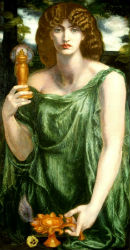Word: Remember, Two Ways
Spell: Part 2
Since the first part of this spell was about remembrance as a tool for creating boundaries, the spell's word is
remember
*The picture is of Mnemosyne, the ancient world's personification of memory, as portrayed by Rosetti.
This looks like an easy one, doesn't it?
- Re = "back"/"again"
- Member = "a part of an organized whole; literally a limb"
And with dis = "apart" and dismember as an apparent opposite, meaning "to break down into constituent parts," we can tell a fine story of how "remember" is a process of putting things back together, taking the separated parts and putting them back together, how all parts of a memory are essential constituents.
It's a great story, and I think it can be a valid story, but it's not the actual etymology of "remember."
- The re part is correct. Bringing something back.
- But it's not limbs/body parts that are being brought back together; it's the mind that's the receptacle to which things are brought back. Latin memorari became (re)membrer in Old French.
Where did that b come from? It's all about ease. It's easier for us to put something in between a nasal, like mmm, and something else, like rrr or ttt. Say the word "something" slowly. When I was a little kid, I thought it should be spelled "somepthing" because that's how most people pronounce it.
Two more like that, one from Ancient Greek, one from Old English (remember, "remember" is Latin going into French)--this isn't something that happens in just one language.
The name "Andrew" comes from the ancient Greek aner, a manly man. Other forms of aner push that n and r together, and the d comes up between them, like andros "of a man."
What about "empty"? It's from an Old English word æmetta -- "leisure." There's that p between the m and t when they got pushed together as the word developed.
Back to our word of the current spell: the "true" etymology says remember is "recalling things back to the mind, and the "folk" etymology says remember is bringing pieces/parts/limbs back together, the opposite of dismember.
As I've said before, folk etymologies pretty much always have some truth to them, at least (inter)subjectively for the one(s) telling the story. Isn't it interesting that in this case the "true" etymology locates memory in the mind and the "folk" etymology locates in the body?
Have you had the experience of opening a drawer and pausing, forgetting what you came for, then leaving the room, going back to where you were when you decided to go look in the drawer, and instantly remembering what it was? That's the easiest way to see that remembering has a bodily, physical component to it.
I find this pair of opportunities a beautiful illustration of the validity of both kinds of etymology, as well as a reminder that body and mind are counterparts.
The "back/again" part, though--it implies that the memory is something we possessed or experienced at some point before and that we can have again. But what of the science that shows we all remember things that didn't actually happen? How can those memories be things that "come back"?
I don't have the definitive answer. Perhaps it's outside my pay grade. What I can say as a linguist, what is obvious even from the multiple etymologies, is that a word doesn't need to be an exact conceptual replica of what it's referring to. In fact it can't be, metaphysically speaking, or we would need a different word for the air or water in every different environment, since their elemental constituents are different, and we'd have far worse miscommunications than we actually do if I couldn't picture a green cup as a large, dark-green china object and still understand as "green cup" an object you bring me that's greenish yellow and comes from a dolls' house.
When we use language, we're individuals pooling our resources in a chorus of individual experiences.
"Remembering" is bringing something back to mind, or bringing physical parts back together, but they may never have been together or in the mind in the first place. If it's all one mind, perhaps everything gets there in the end.
About the Author
Ela Harrison
Ela is a wordsmith and herb lover who has lived in many places and currently resides in Tucson, AZ.
